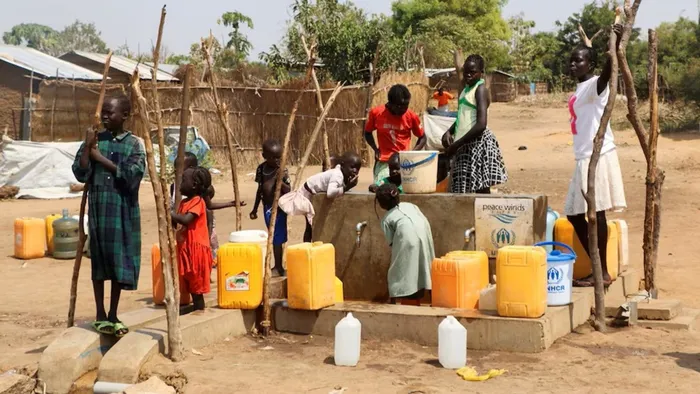International community's moral obligation to silence the guns
SUDAN CONFLICT

Sudanese refugees collect water from a borehole at the Gorom Refugee camp hosting Sudanese refugees who fled fighting, near Juba, in South Sudan.
Image: Reuters
Dr. Sizo Nkala
It has been over two years since civil war broke out in Sudan after the coalition partners of a military government – the Sudanese Armed Forces (SAF) led by Abdel Fattah al-Burhan and the Rapid Support Forces (RSF), a paramilitary group led by Hamdan Hemedti Dagalo – could not find common ground on sharing power.
The conflict has reportedly killed 20000 people and the actual number could be far higher, displaced more than 15 million people and left about 30 million people in need of humanitarian assistance half of which are children. On the 15th of April, the United Kingdom (UK) hosted a conference on Sudan co-chaired by Germany, France, the African Union (AU) and the European Union (EU) aimed at mobilizing humanitarian aid for the millions of suffering Sudanese.
Also in attendance were officials from Kenya, Egypt, Saudi Arabia, and the United Arab Emirates (UAE). However, conspicuously absent were the representatives of the warring parties in Sudan. The conference, the second of its kind after the first one was hosted by France in 2024, managed to raise about US$800 million in aid pledges towards alleviating what has been widely described as the ‘largest humanitarian crisis in the world’.
This amount is significantly less than the over US$2 billion raised at the Paris Conference last year. A joint statement from the conference called for an immediate and permanent ceasefire while stressing the need to prevent the partition of the country. The statement also counselled against external interference in the conflict as it would complicate its resolution.
While the conference was a welcome initiative bringing the much-needed spotlight back to what has been a largely forgotten disaster in the making, it also served as a reality check on how far the conflict is from being resolved. This after Egypt and Saudi Arabia who are the main backers of the SAF and Al-Burhan on the one hand and the UAE which is believed to be the main patron of the RSF on the other hand could not find a point of convergence on the wording of a draft communique.
This resulted in the conference only producing a co-chairs statement rather than a joint communique. While this may seem like bean-counting over semantics – it is important to note that there is an important difference between a statement and a communique in the diplomatic world. While a statement is a report or declaration concerning an issue or an event, a communique is a more formal and official announcement which carries greater diplomatic weight.
A communique is almost a policy statement and signifies a common understanding among those participating in its drafting about the plan of action on a particular matter or issue. While Egypt and Saudi Arabia wanted the communique to call for respecting state institutions and the government in Sudan, the UAE rejected this proposition out of hand and suggested an emphasis on civilian governance.
Egypt and Saudi Arabia’s language preference would have signified some support for the Sudanese government currently constituted by the SAF which they have supplied with weapons and intelligence throughout the war. The UAE’s suggestion of civilian governance would have given the impression that the parties at the conference did not recognise the current government leaving an open question on the future of Sudan’s governance.
On the same day that the conference was taking place in the UK, the RSF declared the formation of the Government of National Unity in the areas falling under its control. In February the RSF and other groups signed a charter in Nairobi, Kenya, announcing plans to form a parallel government. The paramilitary group controls vast tracts of territory in the south-western part of Sudan stretching from the country’s border with Chad to the outskirts of the capital, Khartoum.
The SAF recently recaptured Khartoum from the RSF and is in firm control of much of the south and north-eastern areas of the country including the prized Red Sea coastline. Thus, the civil war in Sudan has effectively become a regional civil war with sponsors of the warring factions having vested interests in its outcome.
This makes the war all the more difficult to resolve as the patrons on both sides of the conflict would want to see a return on their investment. Egypt supports the SAF because it believes it is the only institution with the potential to bring stability to Sudan which would stop the influx of Sudanese refugees into Egypt. The SAF is also a ready ally in Egypt’s tussle over the control of the Nile waters with Ethiopia.
On the other hand, the UAE is interested in exerting its control of the gold trade in Darfur which is largely under the control of the RSF and also gaining a foothold in the Red Sea to facilitate agricultural exports from Sudan. If the patrons do not find common ground, the partition of Sudan will become a more realistic outcome of the war.
The international community must put pressure on Egypt, Saudi Arabia and the UAE to find a way of resolving their differences and bring the devastating proxy war in Sudan to an end.